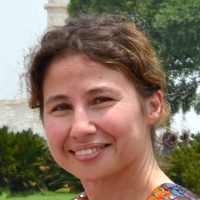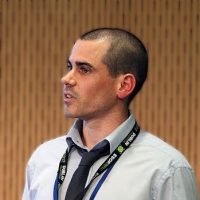Conférenciers invités
| Invité | Titre de la conférence | Horaire |
| Mounia Lalmas | “ Engage moi ” : From retrieval effectiveness, user satisfaction to user engagement | Mercredi 25 janvier 09h30 |
| Claudia d’Amato | “ Machine Learning for the Semantic Web: filling the gaps in Ontology Mining “ | Jeudi 26 janvier 09h00 |
| Dominique Cardon | “ Une approche sociologique de la place des calculs dans les mondes numériques “ | Vendredi 27 janvier 09h30 |
| Freddy Lecue | “ Deep Dive on Smart Cities by Scaling Reasoning and Interpreting theSemantics of IoT“ |
Mercredi 25 janvier 16h00 |
Détail des présentations
 Mounia Lalmas – Yahoo Labs London
Mounia Lalmas – Yahoo Labs London
“Engage moi” :
From retrieval effectiveness, user satisfaction to user engagement
The effective prediction of a click remains a primary challenge in the areas of search, digital media and online advertising. In the context of search, satisfying a user’s information need by returning results that they will click on is an important objective in any information retrieval system. Consequently, information retrieval systems have had a long and varied history of how to evaluate their effectiveness of responding to a given query. However, building such a system that not only only returns relevant results to a user query but also encourages a long-term relationship between the user and the system is far more challenging. In this talk, we review the current state-of-the-art evaluation approaches for search before exploring other ways of quantifying more long-term engagement measures. Finally, the talk ends with a proposal of how the two approaches can be considered together to create a service that optimises for the query and the longer term engagement aspects.
Biographie : Mounia Lalmas is a Director of Research at Yahoo London where she leads a team of scientists working on Advertising Sciences. She also hold an Honorary Professorship at University College London. Her work focuses on studying user engagement in areas such as native advertising, digital media, social media, and search. She also pursue research in social media and search. Prior to this, she held a Microsoft Research/RAEng Research Chair at the School of Computing Science, University of Glasgow. Before that, she was Professor of Information Retrieval at the Department of Computer Science at Queen Mary, University of London. She co-led the Evaluation Initiative for XML Retrieval (INEX), a large-scale project with over 80 participating organizations worldwide, which was responsible for defining the nature of XML retrieval, and how it should be evaluated.

Claudia d’Amato – University of Bari
“ Machine Learning for the Semantic Web: filling the gaps in Ontology Mining “
In the Semantic Web view, ontologies play a key role. They act as shared vocabularies to be used for semantically annotating Web resources and they allow to perform deductive reasoning for making explicit knowledge that is implicitly contained within them. However, noisy/inconsistent ontological knowledge bases may occur, being the Web a shared and distributed environment, thus making deductive reasoning no more straightforwardly applicable. Machine learning techniques, and specifically inductive learning methods, could be fruitfully exploited in this case. Additionally, machine learning methods, jointly with standard reasoning procedure, could be usefully employed for discovering new knowledge from an ontological knowledge base, that is not logically derivable. The focus of the talk will be on various ontology mining problems and on how machine learning methods could be exploited for coping with them. For ontology mining are meant all those activities that allow to discover hidden knowledge from ontological knowledge bases, by possibly using only a sample of data. Specifically, by exploiting the volume of the information within an ontology, machine learning methods could be of great help for (semi-)automatically enriching and refining existing ontologies, for detecting concept drift and novelties within ontologies and for discovering hidden knowledge patterns (also possibly exploiting other sources of information). If on one hand this means to abandon sound and complete reasoning procedures for the advantage of uncertain conclusions, on the other hand this could allow to reason on large scale and to to dial with the intrinsic uncertainty characterizing the Web, that, for its nature, could have incomplete and/or contradictory information.
Biographie : Claudia d’Amato is a research assistant at the University of Bari – Computer Science Department and she got the Habilitation for the function of Associate Professor for the sector “01/B1 – Informatics” on January 2014 (application: round 2012). She obtained her PhD in 2007 from the University of Bari, Italy, defending the thesis titled “Similarity Based Learning Methods for the Semantic Web” for which she got the the nomination as author of one of the Best Italian PhD Thesis in Artificial Intelligence from the Artificial Intelligence Italian Commission for the AI*IA award 2007. She pioneered the research on Machine Learning methods for ontology mining that represents her main research interest. During her research activity she won several best paper awards. She is member of the editorial board of the Semantic Web Journal and Journal of Web Semantics. She served/is serving as Program Chair at ISWC 2017, ESWC 2014, Vice-Chair at ISWC’09, Machine Learning Track Co-Chair at ESWC’12-’13-’16, PhD Symposium chair at ESWC’15 and Workshop and Tutorial Co-Chair at ISWC’12, EKAW’12, ICSC’12. She served/is serving as a program committee member of a number of international conferences in the area of Artificial Intelligence, Machine Learning and Semantic Web such as AAAI, IJCAI, ECAI, ECML, ISWC, WWW, ESWC. She was also co-organizers of the International Workshop on Inductive Reasoning and Machine Learning on the Semantic Web at ESCW’09-’11, the International Uncertainty Reasoning Workshop at ISCW’07-’11, the International Workshop on Linked Data for Information Extraction at ISWC’13-15, the International Workshop on Data Mining on Linked Data at ECML/PKDD’13, the International Workshop on Linked Data for Knowledge Discovery ECML/PKDD’15 and the International Workshop on Cross-fertilizing diverse Domains with and within the Semantic Web at ISWC’15. Claudia d’Amato research activity has been highly appreciated within the community, as documented by her comprehensive network of international academic cooperations, including, e.g., INRIA, Sophia-Antipolis, France (Dr. Fabien Gandon), University of Koblenz-Landau, Germany (Prof. Dr. Steffen Staab), University of Oxford, UK (Prof. Dr. Thomas Lukasiewicz), University of Poznan, Poland (Dr. Agnieszka Lawrynowicz), FBK, Trento, Italy (Dr. Luciano Serafini). Claudia d’Amato research activity has been disseminated through 17 journal papers, 12 book chapters, 53 papers in international collections, 27 papers in international workshop proceedings and 13 articles in national conference and workshop proceedings. She edited 27 books and proceedings and 3 journal special issues.
 Dominique Cardon – Sciences po/Médialab
Dominique Cardon – Sciences po/Médialab
“ Une approche sociologique de la place des calculs dans les mondesnumériques “
Dans cette présentation, on souhaite présenter un regard de sociologue sur les transformations sociales, politiques et culturelles du développement des mondes numériques dans nos sociétés. Les enjeux que doivent relever la fabrication d’environnements informatiques prennent aujourd’hui de plus en plus d’importance : protection de la vie privée, personnalisation des calculs, guidage des conduites, ouverture des données, éthique des automates, etc. Comment nos sociétés réagissent-elles et s’adaptent-elles à ces mutations ? Dans cette cnférence, on propose une réflexion sur le rôle joué par les algorithmes du web dans la construction de l’espace public numérique. Comment les calculateurs produisent-ils de la visibilité ? A partir de quels principes le PageRank de Google, les métriques du web social ou les outils de recommandation décident-ils de donner la prééminence à telle information plutôt qu’à telle autre ? Ces différentes familles de calcul cherchent à mesurer et à valoriser des principes différents : la popularité, l’autorité, la réputation et la prédiction efficace. L’approche proposée dans cette conférence soutient que les manières de calculer enferment des représentations particulières des individus et de leur place dans nos sociétés. Comprendre les algorithmes c’est aussi un moyen de redonner du pouvoir aux utilisateurs et de favoriser une critique éclairée de la manière dont le calcul s’introduit de plus en plus dans nos vies numériques.
Biographie : Dominique Cardon est professeur de sociologie à Sciences po/Médialab. Ses travaux portent sur les usages d’Internet et les transformations de l’espace public numérique. Il étudie les algorithmes permettant d’organiser l’information sur le web. Il a publié récemment A quoi rêvent les algorithmes. Nos vies à l’heure des big data , Paris, Seuil/République des idées, 2015.
 Freddy Lecue – Accenture Technology Labs, INRIA
Freddy Lecue – Accenture Technology Labs, INRIA
“ Deep Dive on Smart Cities by Scaling Reasoning and Interpreting theSemantics of IoT “
Résumé de l’intervention : Modern cities are facing tremendous amount of information, captured from internal infrastructures and/or exogenous sensors, humanincluded. This talk presents how big and heterogenous city data has been captured, represented, unified to serve one of the most pressing city objective: improving quality of city, in particular how understanding and reducing traffic congestion. We will also present lessons learnt from the deployment of our system and experimentation in Dublin (Ireland), Bologna (Italy), Miami (USA) and Rio (Brazil).
Biographie : Dr Freddy Lecue (PhD 2008, Habilitation 2015) is a principal scientist and research manager in large scale reasoning Systems in Accenture Technology Labs, Dublin – Ireland. He is also a research associate at INRIA, in WIMMICS, Sophia Antipolis – France. Before joining Accenture in Junuary 2016, he was a research scientist and lead investigator in large scale reasoning systems at IBM Research – Ireland. His research area is at the frontier of learning, reasoning systems, and Internet of Things with a focus on smart enterprise and city applications (in Dublin – Ireland, Bologna – Italy, Miami – USA and Rio – Brazil). His research has received IBM internal recognition: IBM research division award in 2015 and IBM Technical Accomplishment award in 2014. His research received external recognition: best paper awards from ISWC (International Semantic Web Conference) in 2014, and ESWC (Extended Semantic Web Conference) in 2014, as well as semantic Web challenge awards from ISWC in 2013 and 2012.
